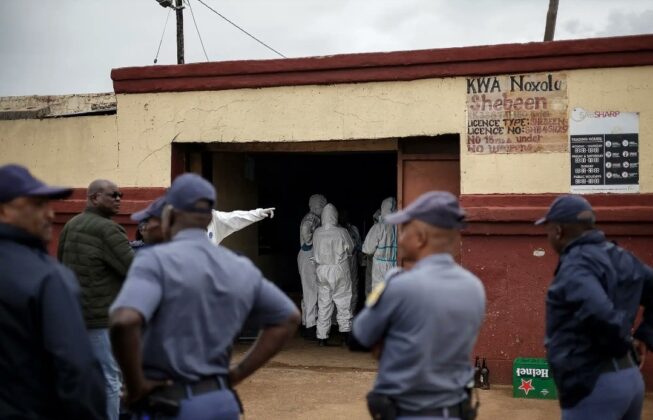French Prime Minister Sébastien Lecornu unveils his new cabinet at the Hôtel de Matignon amid France's deepening political crisis. Image: The Guardian.
(The Post News)– French Prime Minister Sébastien Lecornu resigned on Monday after just 27 days in office, triggering fresh political instability and market shockwaves in Europe. President Emmanuel Macron accepted the resignation from Lecornu, the Elysee Palace announced, amid calls for new elections or even Macron’s own resignation.
Lecornu’s sudden resignation followed only hours after he had unveiled his cabinet, a lineup intended to restore stability but which further polarized an already divided parliament. Lecornu, an ally of Macron, becomes the shortest-serving French prime minister of the Fifth Republic. Moreover, Lecornu is the fifth to quit in less than two years.
Cabinet Unveiling Sparks Outrage
Lecornu presented his 15-member cabinet on Sunday, which meets for the first time on Monday afternoon. But the new administration was criticized from both sides of the political divide immediately. They criticized that it was either too right-leaning or not right-leaning enough and wondered if the government could survive in a divided National Assembly where no party has a majority.
In a resignation speech in Matignon Palace, Lecornu blamed France’s political stalemate on inflexible party leaders. “I was prepared to make concessions, but each party wanted the other to get on board its entire program,” Lecornu said. “You cannot be prime minister when the circumstances simply don’t exist.”
Lecornu also rebuked parties for behaving “as if each had a majority” and attributed egos and deep-rooted rivalries to having made it impossible to govern. The resignation of Lecornu sent French and European financial markets into a tailspin.
The CAC 40 index dropped 1.5%, with Société Générale, BNP Paribas, and Crédit Agricole leading the sharp drops. The euro dropped 0.7% against the U.S. dollar to $1.1665, while French bond yields rose to a one-month high.
The political reaction was immediate and vehement. Far-left leader Jean-Luc Mélenchon called for Macron to be impeachment, while the far-right National Rally (RN) demanded new elections. “There can be no restoration of stability without a restoration to the polls,” RN co-leader Jordan Bardella said. “We’re at the end of the joke,” added Marine Le Pen, accusing Macron of clinging to power amid chaos.
Even conservative allies joined in. The Republicans’ David Lisnard declared Macron “must now choose: dissolution or resignation, and fast.”
Presidency on the Brink
Macron’s presidency has been beset by turmoil since his re-election in 2022. His formerly dominant centrist party has lost its parliamentary majority, and snap elections last year only acted to further splinter the political landscape. The resignation of Lecornu underscores the profound paralysis of the French political system, a state that cannot be governed by stable coalitions, and an increasingly isolated president.
Television images on BFM showed Macron walking alone along the Seine River, a solitary figure embodying his quandary. Analysts envision three possibilities for him: appointing a new prime minister, calling new parliamentary elections, or resigning. Most expect him to choose the first, but faith in his leadership has vanished.
“It’s the strongest sign yet that Macron has reached the wall,” said one political commentator. The commentator highlighted that Lecornu is one of “five prime ministers in less than two years, and France seems to be tired and increasingly done with him.”
Created in 1958 to instil government stability, France’s Fifth Republic is now fracturing under the pressure of political polarization. Macron, once having remade French politics with a centrist landslide in 2017, must now navigate an opposition-led legislature and a crisis-weary public.
As markets plummet, public faith shatters, and calls for new elections mount, France has reached a crossroads, a democracy struggling for balance in a time of fragmentation.



